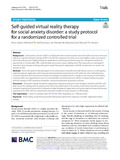Citation link:
http://dx.doi.org/10.25819/ubsi/10244| DC Field | Value | Language |
|---|---|---|
| crisitem.author.orcid | 0000-0002-5612-4083 | - |
| crisitem.author.orcid | 0000-0001-6940-3551 | - |
| crisitem.author.orcid | 0000-0001-5968-429X | - |
| crisitem.author.orcid | 0000-0003-2433-6652 | - |
| dc.contributor.author | Hildebrand, Anne Sophie | - |
| dc.contributor.author | Roesmann (Keuper), Kati | - |
| dc.contributor.author | Planert, Jari | - |
| dc.contributor.author | Machulska, Alla | - |
| dc.contributor.author | Otto, Esra | - |
| dc.contributor.author | Klucken, Tim | - |
| dc.date.accessioned | 2023-01-16T15:03:55Z | - |
| dc.date.available | 2023-01-16T15:03:55Z | - |
| dc.date.issued | 2022 | de |
| dc.description | Finanziert im Rahmen der DEAL-Verträge durch die Universitätsbibliothek Siegen | de |
| dc.description.abstract | Background Social anxiety disorder (SAD) is a highly prevalent mental disorder associated with enormous stress and suffering. Cognitive behavior therapy (CBT) is the first-line treatment for SAD, yet its accessibility is often constrained with long waiting times. Digital therapeutic applications, including psychoeducation and self-guided behavioral experiments in virtual reality (VR), could facilitate access and reduce waiting times. The study aims to investigate if ultra-short-time therapy involving self-guided digital therapeutic applications with VR components can reduce the severity of SAD. Methods Forty SAD patients will participate in this randomized controlled trial. Half will get access to a self-guided, digital therapeutic application with exposure-based behavioral experiments in VR, while the other half will receive a control treatment. Both treatments include four therapeutic appointments. Changes in the severity of SAD will be measured after each appointment and on a 6-week follow-up assessment and will be compared between groups, with the change in SAD measured at baseline- and post-assessment as primary outcome. Discussion Self-guided digital therapeutic applications including ultra-short-time therapy combined with VR could help reduce the waiting time for patients and relieve the health system. The results of this study may inform psychotherapists regarding the potential of self-guided digital therapeutic applications including exposure-based behavioral experiments in VR for SAD and will provide important insight for future research on VR therapy. | en |
| dc.identifier.doi | http://dx.doi.org/10.25819/ubsi/10244 | - |
| dc.identifier.uri | https://dspace.ub.uni-siegen.de/handle/ubsi/2438 | - |
| dc.identifier.urn | urn:nbn:de:hbz:467-24383 | - |
| dc.language.iso | en | de |
| dc.rights | Namensnennung 4.0 International | * |
| dc.rights.uri | http://creativecommons.org/licenses/by/4.0/ | * |
| dc.source | Trials ; 23, article number 395. - https://doi.org/10.1186/s13063-022-06320-x | de |
| dc.subject.ddc | 150 Psychologie | de |
| dc.subject.other | Virtual reality | en |
| dc.subject.other | Social anxiety disorder | en |
| dc.subject.other | Behavioral experiments | en |
| dc.subject.other | Exposure | en |
| dc.subject.other | E-health | en |
| dc.subject.other | Application-based therapy | en |
| dc.subject.swb | Virtuelle Realität | de |
| dc.subject.swb | Angststörung | de |
| dc.subject.swb | Kognitive Verhaltenstherapie | de |
| dc.subject.swb | Experiment | de |
| dc.subject.swb | E-Health | de |
| dc.title | Self-guided virtual reality therapy for social anxiety disorder | en |
| dc.type | Article | de |
| item.fulltext | With Fulltext | - |
| ubsi.origin.dspace5 | 1 | - |
| ubsi.publication.affiliation | Fakultät V - Lebenswissenschaftliche Fakultät | de |
| ubsi.source.doi | 10.1186/s13063-022-06320-x | - |
| ubsi.source.issn | 1745-6215 | - |
| ubsi.source.issued | 2022 | de |
| ubsi.source.pages | 8 | de |
| ubsi.source.place | London | de |
| ubsi.source.publisher | BioMed Central | de |
| ubsi.source.title | Trials | de |
| ubsi.source.volume | 23 | de |
| ubsi.subject.ghbs | HQN | de |
| ubsi.subject.ghbs | HSG | de |
| ubsi.subject.ghbs | HVQH | de |
| ubsi.subject.ghbs | HVRG | de |
| ubsi.title.alternative | a study protocol for a randomized controlled trial | en |
| Appears in Collections: | Geförderte Open-Access-Publikationen | |
Files in This Item:
| File | Description | Size | Format | |
|---|---|---|---|---|
| Self-guided_virtual_reality_therapy_social_anxiety_disorder.pdf | 1.07 MB | Adobe PDF |  View/Open |
This item is protected by original copyright |
Page view(s)
451
checked on Dec 1, 2024
Download(s)
165
checked on Dec 1, 2024
Google ScholarTM
Check
Altmetric
This item is licensed under a Creative Commons License


